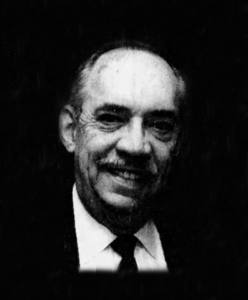
(Sep. 15, 1927-June 30, 1997). Born in Marion County, the self-described “rinky-dink kid from the Southside,” Paul F. Cantwell grew up in and attended elementary school at Holy Name Catholic School. First entering politics at the precinct level around the age of 15, his nickname of “Mr. Democrat” was more than earned.
Cantwell graduated from Cathedral High School in 1945. He then enlisted in the U.S. Navy where he served on a tanker in the China Sea. After his discharge, Cantwell returned to Indianapolis to study at , while also working in the oil and construction industries.
In 1965, Cantwell worked as an administrative assistant for Indiana Congressman in Washington, D.C. He returned to Indianapolis in 1966 and won his first election for . In April 1968, he stood next to Robert F. Kennedy when he gave his speech on the assassination of Martin Luther King Jr. (see ).
In 1970, all but ensured Republican control of Indianapolis. In the election of November 1971, Cantwell won one of only 8 seats held by Democrats in the new City-County Council, while Republicans won 21. Representing the 23rd District in the area of the near southeast side , Cantwell would be Democratic minority leader for the next eight years and a nemesis of Indianapolis Republicans.
Cantwell was often the loudest, and sometimes only, voice demanding accountability from the Republicans and their budget plans. He believed he could best improve local government by criticizing it. Fellow politicians recalled his love of being involved and causing controversy in the Republican-controlled city. he used his position to ensure the Republicans did not go unchallenged in multiple city bond issues for the development of downtown Indianapolis.
While on the City-County Council, Cantwell was active in establishing the to oversee public housing. He supported the extension of the service to create a countywide library system and to raise money for the disabled children of Marion County.
After eight years, Cantwell resigned in 1979 to run for Indianapolis mayor. At this time, the in Indianapolis was disorganized and did not provide an advertising budget for his campaign. Going door to door, volunteers spearheaded Cantwell’s grass-root, self-supported campaign. Cantwell eventually lost his bid for mayor of Indianapolis to longtime Indianapolis mayor .
When he was not a candidate himself, Cantwell used his political clout to guide other candidates. He ultimately hoped to become a catalyst to spark more people to become involved in local politics. His daughter, longtime U.S. Senator Maria Cantwell from Washington state–and an Indianapolis native–credits her father’s legacy in her current success in the Democratic Party.
Cantwell’s last elected office was to the Indiana House of Representatives from 1992-1994, however, he continued to speak out for the residents of Center Township and to work for the Democratic Party until his death after an illness.

Help improve this entry
Contribute information, offer corrections, suggest images.
You can also recommend new entries related to this topic.